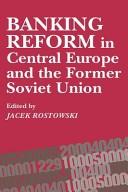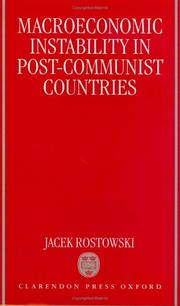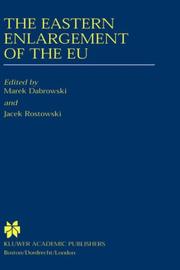| Listing 1 - 10 of 15 | << page >> |
Sort by
|

ISBN: 1858660394 Year: 1995 Publisher: Budapest Central European University Press
Abstract | Keywords | Export | Availability | Bookmark
 Loading...
Loading...Choose an application
- Reference Manager
- EndNote
- RefWorks (Direct export to RefWorks)
336.71 <4-11> --- 338.24 (4-11) --- Bankwezen--Oost-Europa --- Instrumenten van de economische politiek. Economische orde. Economisch politieke maatregelen. Stabilisering. Stimuleringsmaatregelen. Regulering. Financiele steunmaatregelen--Oost-Europa --- Banks and banking --- Congresses. --- 338.24 (4-11) Instrumenten van de economische politiek. Economische orde. Economisch politieke maatregelen. Stabilisering. Stimuleringsmaatregelen. Regulering. Financiele steunmaatregelen--Oost-Europa --- 336.71 <4-11> Bankwezen--Oost-Europa --- Agricultural banks --- Banking --- Banking industry --- Commercial banks --- Depository institutions --- Finance --- Financial institutions --- Money --- Congresses
Book
ISBN: 1462310699 1455295884 Year: 1994 Publisher: Washington, D.C. : International Monetary Fund,
Abstract | Keywords | Export | Availability | Bookmark
 Loading...
Loading...Choose an application
- Reference Manager
- EndNote
- RefWorks (Direct export to RefWorks)
The reasons for the growth of interenterprise debt are analyzed. It is suggested that it results mainly from the appearance of normal trade credit in a liberalized economy, and when a monetary squeeze is part of a stabilization attempt that is not credible. In the latter case, the result can be a sharp fall in output. Non-market and market solutions to this problem are analyzed, and the advantages of the latter over the former are stressed.
Bank credit --- Banking --- Banks and Banking --- Banks and banking --- Banks --- Central Banks and Their Policies --- Central banks --- Comparative Analysis of Economic Systems --- Credit --- Currencies --- Currency issuance --- Depository Institutions --- Government and the Monetary System --- Micro Finance Institutions --- Monetary base --- Monetary economics --- Monetary Policy --- Monetary Policy, Central Banking, and the Supply of Money and Credit: General --- Monetary Systems --- Money and Monetary Policy --- Money supply --- Money --- Mortgages --- Payment Systems --- Regimes --- Socialist Institutions and Their Transitions: Financial Economics --- Standards --- Romania
Book
ISBN: 1462318797 1455236330 Year: 1994 Publisher: Washington, D.C. : International Monetary Fund,
Abstract | Keywords | Export | Availability | Bookmark
 Loading...
Loading...Choose an application
- Reference Manager
- EndNote
- RefWorks (Direct export to RefWorks)
The primary function of banks during economic transformation is seen to be provision of an efficient payments mechanism. The lack of banking skills, particularly in credit allocation, is seen as the major problem in stable monetary systems. This is a problem which can be expected to last many years. The solution is to limit banks to very safe assets (initially central bank liabilities). Combining such safe banks with a monetary rule would provide stable monetary systems during transition.
Banking --- Banks and Banking --- Banks and banking --- Banks --- Central banks --- Commercial banks --- Comparative Analysis of Economic Systems --- Currencies --- Depository Institutions --- Financial institutions --- Foreign exchange reserves --- Government and the Monetary System --- International finance --- International reserves --- Micro Finance Institutions --- Monetary base --- Monetary economics --- Monetary Policy --- Monetary Policy, Central Banking, and the Supply of Money and Credit: General --- Monetary Systems --- Monetary systems --- Money and Monetary Policy --- Money supply --- Money --- Mortgages --- Payment Systems --- Regimes --- Socialist Institutions and Their Transitions: Financial Economics --- Standards --- Russian Federation

ISBN: 0198290489 Year: 1998 Publisher: Oxford : Clarendon press,
Abstract | Keywords | Export | Availability | Bookmark
 Loading...
Loading...Choose an application
- Reference Manager
- EndNote
- RefWorks (Direct export to RefWorks)
Economic stabilization --- Finance --- Post-communism --- Economic aspects

ISBN: 1858660386 9633865573 Year: 1995 Publisher: Budapest Central European university
Abstract | Keywords | Export | Availability | Bookmark
 Loading...
Loading...Choose an application
- Reference Manager
- EndNote
- RefWorks (Direct export to RefWorks)
Book
Year: 1993 Publisher: London : The centre for economic performance,
Abstract | Keywords | Export | Availability | Bookmark
 Loading...
Loading...Choose an application
- Reference Manager
- EndNote
- RefWorks (Direct export to RefWorks)
POLOGNE --- CROISSANCE ECONOMIQUE --- THEORIE MACROECONOMIQUE --- PRIVATISATION --- ENTREPRISE PUBLIQUE

ISBN: 0792378288 146135689X 1461517095 Year: 2001 Publisher: Boston, Mass. Kluwer Academic
Abstract | Keywords | Export | Availability | Bookmark
 Loading...
Loading...Choose an application
- Reference Manager
- EndNote
- RefWorks (Direct export to RefWorks)
The Eastern Enlargement of the EU identifies the major fiscal challenges facing Central European countries on the road to European Union accession. The Introduction and three other chapters are on broad macro-economic issues, and four `sectoral' chapters follow these on such questions as the fiscal impact of pensions, health reform, taxation and agricultural policies. A comprehensive analysis of tax systems and of the major elements of public social expenditures (pensions and health care systems) is presented. This analysis helps to identify the key factors determining the present size of governments and the need for, and prospects of, fiscal adjustment. In addition, a comparison of fiscal policy is carried out, followed by a long-term fiscal projection until year 2010. The book is relevant to academics in macroeconomics, European studies and transition economics, as well as in public finance and public policy sciences. It should also appeal to a significant professional audience. Policy makers and economists interested in the accession process in EU countries - at ministries, National Banks, research departments of banks, international organizations (the EU Commission, World Bank, IMF, OECD) - will have a strong interest in this book.
Fiscal policy --- -Fiscal policy --- -European Union --- -#SBIB:023.IO --- #SBIB:327.7H231 --- #SBIB:328H27 --- Tax policy --- Taxation --- Economic policy --- Finance, Public --- Europese Unie: sociaal-economisch beleid, landbouw-, milieu-, cultuur- en communicatiebeleid --- Instellingen en beleid: Midden- en Centraal Europa: algemeen --- Government policy --- Europe, Eastern --- Europe, Central --- -Europe --- Central Europe --- East Europe --- Eastern Europe --- -Economic policy --- Economic integration. --- Europe centrale --- #SBIB:023.IO --- European Union --- E.U. --- Europe --- Economic policy. --- 334.153.0 --- EEC / European Union - EU -Europese Unie - Union Européenne - UE --- EEU / Central & Eastern Europe --- Betrekkingen tussen de Europese Gemeenschappen en de geassocieerde of derde landen: algemeenheden --- Economic conditions. Economic development --- International economic relations --- Eastern and Central Europe --- Politique fiscale --- Europe de l'Est --- Economic integration --- Politique économique --- Intégration économique --- Political science. --- Finance. --- Macroeconomics. --- International economics. --- Political Science. --- Finance, general. --- Macroeconomics/Monetary Economics//Financial Economics. --- International Economics. --- Economic policy, Foreign --- Economic relations, Foreign --- Economics, International --- Foreign economic policy --- Foreign economic relations --- Interdependence of nations --- International economic policy --- International economics --- New international economic order --- International relations --- Economic sanctions --- Economics --- Funding --- Funds --- Currency question --- Administration --- Civil government --- Commonwealth, The --- Government --- Political theory --- Political thought --- Politics --- Science, Political --- Social sciences --- State, The

ISBN: 0387257640 1441938346 9786610618705 1280618701 0387257667 9780387257648 Year: 2006 Publisher: Dordrecht : Springer,
Abstract | Keywords | Export | Availability | Bookmark
 Loading...
Loading...Choose an application
- Reference Manager
- EndNote
- RefWorks (Direct export to RefWorks)
The Eastern Enlargement of the EU will not be complete until the new member states join the EMU. Economic and political economy arguments point to fast EMU accession of new member states. Failure to do so will create a two speed Europe, a fundamental change in the economic and political architecture of the EU, adding to the strains already evident between core and peripheral countries. Current high level of trade and business cycle integration of new member states with the Eurozone, decreases the probability of asymmetric shocks. Lower transaction costs, elimination of exchange rate risk and the danger of currency crises, further trade and investment creation, lower interest rates and large fiscal gains, should outweigh the loss of the exchange rate as adjustment tool. The Eastern Enlargement of the Eurozone provides comprehensive economic analysis of theoretical, empirical and political issues that will determine whether EMU enlargement is a success, which has implications for all common currency systems.
Fiscal policy --- European Union --- Europe, Eastern --- Europe, Central --- Europe --- Economic policy --- Economic policy. --- Economic integration. --- centraal europa --- europe de l'est --- eurozone --- union europeenne --- Tax policy --- Taxation --- Finance, Public --- europe centrale --- oost europa --- zone euro --- europese unie --- Government policy --- E.U. --- international --- modeles economiques --- situation economique --- internationaal --- economische modellen --- economische toestand --- European Economic Community lite. --- Economics. --- Macroeconomics. --- International economics. --- European Integration. --- Economics, general. --- Macroeconomics/Monetary Economics//Financial Economics. --- International Economics. --- Economics --- Economic theory --- Political economy --- Social sciences --- Economic man --- Economic policy, Foreign --- Economic relations, Foreign --- Economics, International --- Foreign economic policy --- Foreign economic relations --- Interdependence of nations --- International economic policy --- International economics --- New international economic order --- International relations --- Economic sanctions --- European Economic Community literature. --- Management science. --- Quantitative business analysis --- Management --- Problem solving --- Operations research --- Statistical decision
Digital
ISBN: 9780387257662 Year: 2006 Publisher: Boston, MA Springer
Abstract | Keywords | Export | Availability | Bookmark
 Loading...
Loading...Choose an application
- Reference Manager
- EndNote
- RefWorks (Direct export to RefWorks)
Macroeconomics --- Foreign trade. International trade --- wereldeconomie --- macro-economie --- internationale economie --- Europese eenmaking --- Europe
Book
ISBN: 9780387257662 Year: 2006 Publisher: Boston MA Springer US
Abstract | Keywords | Export | Availability | Bookmark
 Loading...
Loading...Choose an application
- Reference Manager
- EndNote
- RefWorks (Direct export to RefWorks)
The Eastern Enlargement of the EU will not be complete until the new member states join the EMU. Economic and political economy arguments point to fast EMU accession of new member states. Failure to do so will create a two speed Europe, a fundamental change in the economic and political architecture of the EU, adding to the strains already evident between core and peripheral countries. Current high level of trade and business cycle integration of new member states with the Eurozone, decreases the probability of asymmetric shocks. Lower transaction costs, elimination of exchange rate risk and the danger of currency crises, further trade and investment creation, lower interest rates and large fiscal gains, should outweigh the loss of the exchange rate as adjustment tool. The Eastern Enlargement of the Eurozone provides comprehensive economic analysis of theoretical, empirical and political issues that will determine whether EMU enlargement is a success, which has implications for all common currency systems.
Macroeconomics --- Foreign trade. International trade --- wereldeconomie --- macro-economie --- internationale economie --- Europese eenmaking --- Europe
| Listing 1 - 10 of 15 | << page >> |
Sort by
|

 Search
Search Feedback
Feedback About UniCat
About UniCat  Help
Help News
News